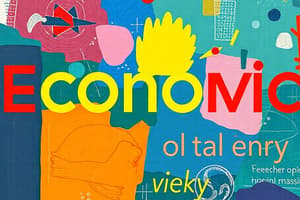Podcast
Questions and Answers
What does the term 'Inflation' refer to?
What does the term 'Inflation' refer to?
- Government spending on infrastructure
- The rate at which the unemployment rate is increasing
- Decrease in economic growth
- Increase in the overall price level of goods and services (correct)
What is a recession?
What is a recession?
A significant decline in economic activity across the economy lasting longer than a few months.
What is fiscal policy?
What is fiscal policy?
- Policies related to international trade
- Measures to control the money supply
- Strategies for managing inflation
- Government adjustments to spending and tax rates (correct)
What is a stimulus?
What is a stimulus?
Which entity is referred to as a 'central bank'?
Which entity is referred to as a 'central bank'?
A pandemic only affects health and does not have economic implications.
A pandemic only affects health and does not have economic implications.
What is meant by 'unemployment rate'?
What is meant by 'unemployment rate'?
What does 'geopolitical' refer to?
What does 'geopolitical' refer to?
What is 'volatility' in the context of financial markets?
What is 'volatility' in the context of financial markets?
Debt pile refers to the amount of savings a person has.
Debt pile refers to the amount of savings a person has.
Which of the following best describes 'sustainability'?
Which of the following best describes 'sustainability'?
Flashcards
Inflation
Inflation
A general increase in prices for goods and services over time, reducing the buying power of money.
Recession
Recession
A significant decline in economic activity, often marked by two consecutive quarters of negative GDP growth.
Growth (Economic)
Growth (Economic)
An increase in the production of goods and services in an economy, often measured by GDP growth.
Fiscal Policy
Fiscal Policy
Signup and view all the flashcards
Stimulus (Economic)
Stimulus (Economic)
Signup and view all the flashcards
Supply Chain
Supply Chain
Signup and view all the flashcards
Resilience (Economic)
Resilience (Economic)
Signup and view all the flashcards
Central Bank
Central Bank
Signup and view all the flashcards
Pandemic
Pandemic
Signup and view all the flashcards
GDP
GDP
Signup and view all the flashcards
Unemployment Rate
Unemployment Rate
Signup and view all the flashcards
Unemployment Insurance
Unemployment Insurance
Signup and view all the flashcards
Interest Rate
Interest Rate
Signup and view all the flashcards
Fiscal Deficit
Fiscal Deficit
Signup and view all the flashcards
Stimulus Package (Government)
Stimulus Package (Government)
Signup and view all the flashcards
Monetary Policy
Monetary Policy
Signup and view all the flashcards
Productivity Growth
Productivity Growth
Signup and view all the flashcards
Geopolitical Problems
Geopolitical Problems
Signup and view all the flashcards
Risk Management
Risk Management
Signup and view all the flashcards
Currency Fluctuations
Currency Fluctuations
Signup and view all the flashcards
Study Notes
Economic Terms
- Inflation: A general increase in prices for goods and services over a period of time, leading to a decrease in the purchasing power of currency.
- Recession: A significant decline in economic activity, typically marked by two consecutive quarters of negative GDP growth.
- Growth: An increase in the production of goods and services in an economy, often measured by GDP growth.
- Fiscal policy: Government actions that influence the economy through spending, taxation, and borrowing.
- Stimulus: Government measures designed to boost economic activity, often through increased spending or tax cuts.
- Supply Chain: The network of companies and activities involved in the production and distribution of goods and services.
- Resilient: The ability of an economy or system to withstand shocks and maintain stability.
- Central bank: An institution responsible for managing a country’s monetary policy, including interest rates and the money supply
- Pandemic: A widespread infectious disease affecting a large population.
- Stimulus Package: A set of government programs aimed at stimulating the economy, typically during a recession or crisis.
- Deficit: A situation where government spending exceeds government revenue.
- Unemployment rate: The percentage of the labor force that is unemployed and actively seeking work.
- Unemployment Insurance: A government program that provides temporary financial assistance to individuals who have lost their jobs.
- Geopolitical: Relating to the political relationships between countries and their impact on global affairs.
- Discretionary Spending: Government spending that is not mandated by law and can be adjusted by policymakers.
- Interest Rate: The cost of borrowing money, expressed as a percentage of the principal amount.
- Soft Landing: A slowdown in economic growth without causing a recession.
- Blockbuster: A highly successful product or event.
- IMF (International Monetary Fund): An international organization that provides financial assistance and policy advice to countries experiencing economic difficulties.
- Gross Domestic Product (GDP): The total value of goods and services produced in a country during a specific period.
- Euro Area: The group of European countries that use the euro as their common currency.
- Outperformance: Performing better than a benchmark or expectation.
- Churn: The rate at which employees leave and join an organization.
- Productivity Growth: The increase in the output of goods and services per unit of input.
- Pandemic Relief: Government programs and policies designed to help individuals and businesses cope with the economic impact of a pandemic.
- Energy Prices: The cost of fuels, such as oil, natural gas, and electricity.
- Volatility: The tendency for prices or other economic indicators to fluctuate rapidly and unpredictably.
- Disruptions: Sudden or unexpected events that disrupt normal economic activity.
- Fortune: Wealth, success, or good luck.
- Demographics: Statistical characteristics of a population, such as age, gender, and income.
- Median Age: The age that divides a population into two halves, with half being older and half being younger.
- Discretionary Products: Goods and services that are not essential for basic needs and are purchased based on personal preference.
- Geopolitical Problems: Issues related to international relations and the distribution of power among countries.
- Insulation: Protection from economic shocks or external factors.
- Fiscal Deficit: A situation where government spending exceeds government revenue.
- Policy Divergence: Differences in economic policies between countries or regions.
- Spillover Effects: The impact of economic policies or events in one country or region on other countries or regions.
- Resilience: The ability to bounce back from setbacks or adversity.
- Monetary Policy: Actions taken by a central bank to manage the money supply and interest rates.
- Debt Pile: A large accumulation of borrowing.
- Inflationary Pressure: Factors that contribute to an increase in prices.
- Brick-and-Mortar: Traditional physical stores or businesses.
- Convenience: Ease of use or access.
- Traditional Retail: The traditional way of selling goods and services through physical stores.
- Delivery Services: Businesses that transport goods and services to customers.
- Environmental Impact: The effect of human activities on the environment.
- Gig Economy: A labor market characterized by short-term, freelance, or project-based work.
- Health Insurance: A type of insurance that covers the cost of medical care.
- Paid Holidays: Days off work that are paid by an employer.
- Sustainability: The ability to meet the needs of the present generation without compromising the ability of future generations to meet their own needs.
- Eco-friendly: Products or services that are environmentally friendly.
- Renewable Energy: Energy sources that are naturally replenished, such as solar, wind, and hydro power.
- Ethically Sourced: Products or services that are produced in a way that is socially and environmentally responsible.
- Investment: The use of money to purchase assets or make financial ventures with the expectation of generating profits.
- Loan: A sum of money lent to someone with the expectation of repayment, usually with interest.
- Investor: An individual or organization that invests money to make a profit.
- Financial risks: The possibility of losing money due to unforeseen events or circumstances.
- Subprime Mortgage: A mortgage loan issued to borrowers with poor credit histories or low credit scores.
- Bailout: Government assistance provided to a failing company or financial institution to prevent its collapse.
- Bankrupt: Unable to pay debts and legally declared insolvent.
- Stock Market: A market where shares of publicly traded companies are bought and sold.
- Regulation: Rules or laws established by government to control or govern a specific industry or activity.
- Employees: People who work for an organization.
- Compliance: Adherence to rules, laws, or regulations.
- Legal Environment: The laws and regulations that govern business activities.
- Contracts: Legally binding agreements between parties.
- Fines: Penalties imposed for violating laws or regulations.
- Shutdown: The temporary or permanent closure of a business or operation.
- Overseas Expansion: The process of expanding a business into countries outside of its home market.
- Foreign Markets: Markets located in countries outside of a company’s home market.
- Trust: Confidence in the reliability, integrity, and honesty of a person or organization.
- Employment Laws: Laws that govern the relationship between employers and employees.
- Taxes: Payments levied by a government on individuals and businesses.
- Challenges: Difficulties or obstacles faced by a business or organization.
- Not-for-profit organizations: Organizations that are not established for profit and typically focus on social or charitable goals.
- Market adaptation: The process of changing a product or service to suit the needs of a particular market.
- Cross-Cultural Management: The process of managing a diverse workforce or operating in different cultures.
- International Expansion: The process of expanding a business into countries outside of its home market.
- Cultural Sensitivity: Awareness of cultural differences and the ability to interact appropriately in different cultures.
- Local Laws: Laws and regulations specific to a particular country or region.
- Employment Regulations: Laws and rules that govern how employers hire, manage, and terminate employees.
- Taxation Policies: Government policies related to the collection of taxes.
- Cultural Misunderstandings: Conflicts or challenges arising from differences in cultural values or behaviors.
- Global Strategy: A plan outlining how a business will compete in the global marketplace.
- Local Customization: Adapting products, services, or marketing campaigns to meet the needs of specific local markets.
- Market Penetration: The proportion of a market that a company controls.
- Market Entry: The process of entering a new market, such as a country or region.
- Risk Management: Procedures and strategies used to identify, assess, and manage potential risks.
- Global Supply Chain: A network of companies involved in the production and distribution of goods and services across multiple countries.
- Import Restrictions: Government policies that limit or restrict the importation of certain goods or services.
- Currency Fluctuations: Changes in the value of one currency relative to another.
Studying That Suits You
Use AI to generate personalized quizzes and flashcards to suit your learning preferences.





